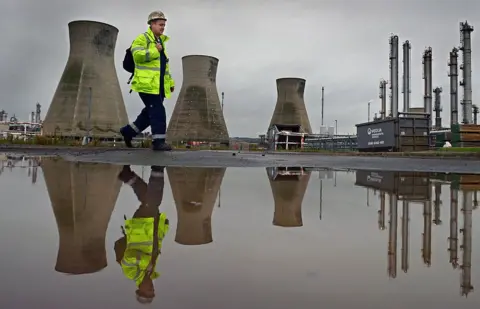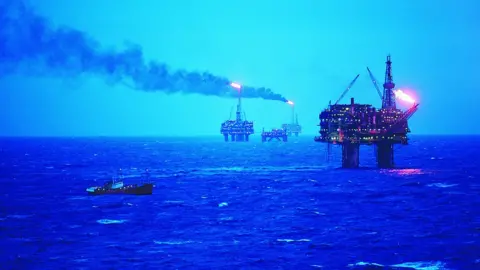Cracking crude: Blame game over Grangemouth's symbolic loss
 Getty Images
Getty Images- Plans to close down Grangemouth refinery go much further than the threat of job losses - it has been a pivotal part of the Scottish economy since before North Sea oil.
- Dependence on imported refined oil for transport, heating and industry raises questions about strategy and energy security, when that is being contested politically.
- Sir Jim Ratcliffe, the man whose company has controlled the complex for 18 years, is scathing about political management of North Sea assets. So are his environmental critics.
The loss of 400 jobs is a severe blow if you have one of them. The long-told story of industrial decline in Scotland has us conditioned to seeing major plant closures as human stories about the scrapheap and stricken family budgets.
But at the risk of sounding unsympathetic, the people who run the refinery at Grangemouth are skilled, and those skills are transferable.
There is keen competition for similar industrial skills in other parts of the energy sector, and a lot more demand for skills can be expected. A "green freeport" is being created around the Firth of Forth.
So there may be more significant consequences of the proposed closure of the refinery than the loss of jobs.
Grangemouth refinery and petro-chemical plants have long been a vital hub of the Scottish economy, refining oil and gas long before the Forties pipeline began to pump them into the Forth Valley complex in the 1970s.
The energy sector in the area goes back to James 'Paraffin' Young, a pioneer of the fossil fuel industry, who cracked sandstone in modern-day West Lothian to release natural gas.
Energy security
To become a terminal at which ships offload imported, refined product for use in the UK is something of a blow to the area's pride. There are parallels with the collapsing steel plant at Ravenscraig 31 years ago.
It also raises questions about Britain's energy strategy and about security of supply. That has become part of the dispute and debate in politics over the pace at which the UK's oil and gas industry should be allowed or required to wind down.
Maintaining a flow of oil and gas from UK fields is seen as protection against unfriendly powers who wield so much of the clout in global energy trading. But there's not much you can do with crude oil if you don't have the capacity to refine it.
And if Grangemouth closes, there will be only five refineries left in Britain: two in the North East, one near Southampton, one in West Wales and one on Merseyside. For heavy oil from Scottish waters, refineries in the European Union are more suitable. Without Grangemouth's cracking tower, Scotland and much of the north of England would rely on refined product being shipped in.
'Punitive taxes'
One of those raising these issues in late September was Sir Jim Ratcliffe, the founder and chairman of Ineos which owns half the refinery joint venture, along with Petro-China.
The multi-billionaire, who took over Grangemouth in 2005, was scathing about the way in which the decline in the North Sea is being handled politically.
At that time, his focus was on another Ineos asset, the Forties Pipeline Network, which brings 40% of offshore production onshore in Aberdeenshire and down into Grangemouth for refining.
He warned then that there had been (coincidentally) a 40% decline in oil flowing through it over the six years since Ineos bought it.
 Getty Images
Getty ImagesIt was reported 18 months ago that there could be closure and job losses, with the Sunday Times saying the Chinese partners were fed up paying for the losses. Covid plunged the refinery into a vast deficit, with asset revaluation taking the 2020 pre-tax loss to £428m.
In November of that year, the company decided to "re-size" operations, cutting down to one catalytic cracker with capacity for 150,000 barrels per day. That would focus its trading arm at the UK domestic market, and give up on exports. So that year, it restated the value of its assets, booking a decline of £337m.
The most recent accounts, covering 2021, show a less staggering pre-tax loss, but it's still hefty, at nearly £51m.
Sir Jim Ratcliffe believes the decline in feedstock for his Scottish refinery and chemicals plant has been caused by "a combination of punitive windfall taxes and negative signals from politicians on the future of the North Sea".
The Ineos boss commented: "The UK's total lack of an energy policy is completely irresponsible.
"The rest of the world is encouraging local oil and gas production, incentivising production through sensible taxation."
He went on: "The UK is doing the opposite. It seems intent on rapidly destroying North Sea production through punitive windfall taxes, disincentives and negative comments, making us totally reliant on overseas supplies and losing billions in potential revenue."
Ineos, don't forget, is also a major producer of oil and gas in the North Sea, and is paying a whack of that 75% marginal rate of tax on profits from its UK output. His anger may be part of his robust approach to lobbying governments. It looks like there may be wriggle room about staying the refinery's execution.
His company is also global, and getting increasingly integrated into state-owned Chinese companies, operating on a vastly bigger scale than its legacy asset near Falkirk.
If the Scottish government is tempted to get involved, trying to persuade Sir Jim Ratcliffe and his Chinese partners that it can see a way to keep the refinery going, it will also be aware that critics of the industry would pounce if public money is put into a rescue.
 Getty Images
Getty ImagesFriends of the Earth responded to the closure with no regret, except that the people affected have not had adequate preparation for the "just transition" from fossil fuels to green energy.
"Today's announcement is, sadly, the inevitable consequence of the Scottish government's repeated failure to grasp this reality and to put concrete transition plans in place with workers," according to the environmental pressure group.
Symbolic
So with the decline of North Sea oil and gas under way for 23 years, and its continued falling output assumed, we're into a blame game.
Rishi Sunak, while Chancellor of the Exchequer, chose to introduce that windfall tax, under pressure from their political opponents. (His successor, Jeremy Hunt, is drawing up a more predictable model of taxing future windfall profits.)
Labour wants to squeeze more out of those profits. And while Tories U-turned on Boris Johnson's COP26 preference for accelerating the decline in oil and gas, Labour is pushing further, saying it will award no further drilling licences if it wins the election next year.
The SNP, while lacking power over the industry from its Holyrood administration, is in an awkward place in favour of just transition, on condition of more mitigation of the impact of drilling, and preferably not just yet. It is receiving withering "asleep at the wheel" criticism for its approach to the sector from its former leader, Alex Salmond.
The former oil economist says: "Instead of refining our own hydrocarbon product range with all the environmental benefits of proximity, Scotland will soon import them from around the planet, with a far greater carbon impact. In addition, the plans for a carbon capture and hydrogen hub at Grangemouth must now be at serious risk."
It seems unlikely the Grangemouth refinery will be the last oil and gas asset to close amid job losses and recrimination. But there can be few as prominent and pivotal to the Scottish economy, and as symbolic of the transition now under way.
